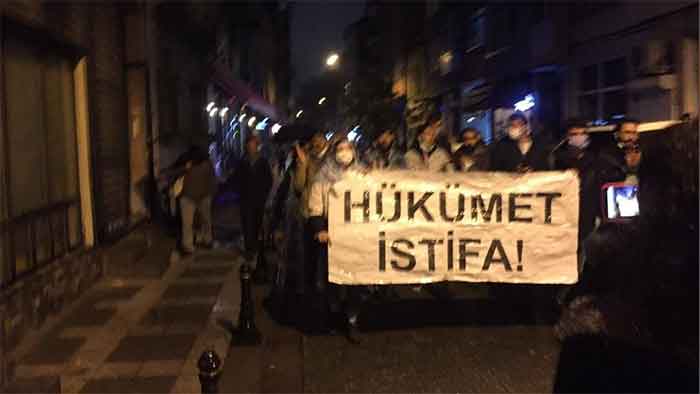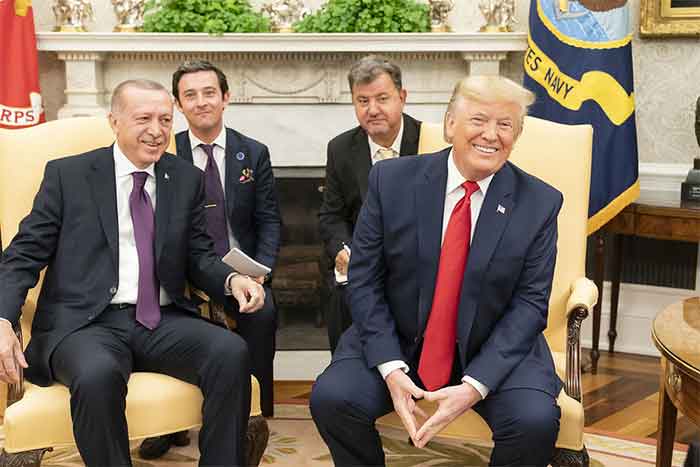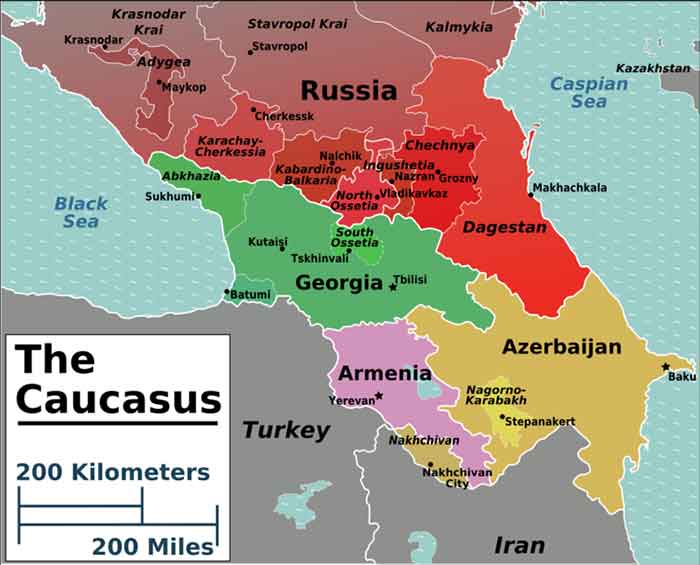
Protests were held in Turkey’s largest city Istanbul and the capital Ankara on Nov. 23 after the lira’s historic crash. Protesters were demanding the resignation of Turkey’s President Recep Tayyip Erdogan and his government over skyrocketing inflation.
The protests come amid an escalating currency crisis. The Turkish lira has gone from $0.1 to $0.078 in value just over the past week, in the worst slide since 2018.
Media reports from Turkey said:
Groups of protesters marched in Istanbul and Ankara, as they called on the ruling Justice and Development Party (AKP) to resign. “Go away AKP, this country is ours,” chanted the protesters.
In Ankara, protesters marched in the Çankaya district.
Middle East Technical University (ODTÜ) students took to the streets to protest and called for Erdogan’s resignation.
In Istanbul, Boğaziçi University students marched with the same demand.
Police prevented a group of protesters from marching in Istanbul’s Şişli district. Police barricades were placed on Taksim Square, the scene of the 2013 Gezi protests.
AKP To The Grave, People To Power
In Istanbul’s Kadıköy, protesters chanted, “AKP to the grave, people to power!”
There were reports of protests in the northwestern city of Eskişehir and the Aegean province of İzmir.
Turkey’s lira nosedived 15% on Nov. 23 in its second-worst day ever after Erdogan defended recent sharp rate cuts, and vowed to win his “economic war of independence” despite widespread criticism and pleas to reverse course.
The lira tumbled as far as 13.45 to the dollar, plumbing record troughs for an 11th straight session, before paring some losses. It has shed 45% of its value this year, including a near 26% decline since the beginning of last week.
Over 263,000 tweets were shared during the day that called on the government to resign in the face of the economic crisis.
Erdogan has applied pressure on the central bank to pivot to an aggressive easing cycle that aims, he says, to boost exports, investment and jobs – even as inflation soars to near 20% and the currency depreciation accelerates, eating deeply into Turks’ earnings.
Many economists called the rate cuts reckless while opposition politicians appealed for immediate elections.
After a meeting between Erdogan and central bank Governor Şahap Kavcıoglu, the bank issued a statement saying the selloff was “unrealistic and completely detached” from economic fundamentals.
There was no hint at an intervention to stem the meltdown. The central bank said it could only do so under certain conditions in “excessive volatility.”
On Tuesday evening, protesters marched down the streets of Ankara’s Çankaya neighborhood, where most Turkish government buildings and government institutions are located.
They chanted “istifa” (resign) and the name of Erdogan’s ruling party — Justice and Development Party (AKP). Many blew whistles and banged pots and pans to make noise.
Erdogan has defended his government’s monetary policy, saying he will not engage in “the game played by those over the currency, interest and price hikes,” but will proceed with his own economic plan instead.
Unrest has since spread to Istanbul, which is ruled by the Republican People’s Party (CHP), Erdogan’s opposition on the national level.
One of the videos shared on social media showed riot police clashing with the protesters in the Kurtuluş neighborhood of Istanbul.
Istanbul has recently seen a series of political clashes between the CHP and the AKP over allegations of corruption and misconduct.
This Is Treason: Opposition Blasts Government
Turkey’s opposition parties have been strengthening their cooperation further amid the Lira’s historic crash against the dollar.
Future Party leader Ahmet Davutoglu, who is also President Recep Tayyip Erdogan’s former prime minister, said that the government’s handling of the economy is not mere “ignorance,” but instead “betrayal” to the country. “I call on all our political parties’ leaders and valuable nation to start the real economic War of Independence against this betrayal,” Davutoglu tweeted on Nov. 23.
Afterwards, he met with main opposition Republican People’s Party (CHP) leader Kemal Kılıçdaroglu. The two held a press meeting during which they once again urged the government to declare early elections.
“What we have gone through during the day cannot be explained or interpreted as a mere economic crisis. The picture that we are facing right now is completely the product of wrong policies of the government. I call onto the government; do not proceed on this wrong road any longer,” Davutoglu said during the press conference.
Kılıçdaroglu touched upon Erdogan’s intervention at the Central Bank, saying the bank is no longer conducting monetary policy to achieve price stability.
“The institution that is responsible from the price stability, i.e. the Central Bank, can no longer do this. It is just observing it. Its authority has been taken from it. Who took it? Erdogan did — just with a decree,” Kılıçdaroglu said.
Former Economy Minister Ali Babacan who currently chairs the opposition Democracy and Progress Party (DEVA) similarly slammed Erdogan, saying he “does not know what he is doing.”
“You had previously announced the dollar forecast as 10.30 for the year 2024; and in less than three months, the exchange rate has surpassed the level of 13. You do not know what you are doing,” Babacan said during an opening ceremony of a party building on Nov. 23.
İYİ (Good) Party executives held an emergency meeting at the party quarters with regards to the course of the economy and later held a press meeting.
Once again calling on Erdogan to declare elections, the İYİ Party said that following the shift to the executive presidential system in 2018, the lira started to lose value at an unprecedented level.
“Just in the last week, all of our citizens have each lost 20,000 liras. This money has gone to those who make money from interest, pro-government contractors and pro-government investors. In one year, we have turned into a country that got poorer a total of 170 billion dollars,” said the İYİ Party statement, which was made by Ümit Özlale, the vice chair for economic development policies of the party.
Peoples’ Democratic Party (HDP) is also preparing to discuss the lira’s historic downward slide.
During his party’s parliamentary group meeting on Nov. 23, Kılıçdaroglu referred to Erdogan as “the national security problem” of Turkey after the latter defended the Central Bank’s continued contentious interest rate cuts amid rising double-digit inflation despite widespread criticism.
Kılıçdaroglu slammed Erdogan’s description of his government’s handling of the economy as an “economic war of independence,” by saying it was Erdogan’s ruling AKP that has been ruling the country for the last 20 years.
“Erdogan is saying, ‘We will triumph in this economic War of Independence.’ What happened that you started to hold a National War of Independence? Was it another person ruling this country? Where were you for the last 20 years?” Kılıçdaroglu asked.
İYİ Party said that the current executive presidency system has brought the country to a point of bankruptcy, saying the lack of an inspection mechanism is the reason of the deepening economic crisis.
“This monstrous system, in which one single person acts as the Central Bank Governor, Economics Minister, Prime Minister, President and the heads of many other positions, has brought our country to the verge of bankruptcy,” said İYİ Party deputy chair Bahadır Erdem.
HDP co-chair Pervin Buldan said during her party’s parliamentary group meeting on Nov. 23: “This exchange rate surpassed 12 today. Do you know what this is? This is the vote level that the AKP will get in the next elections. I give the good news of this from here, and good luck to the AKP. The junior coalition partner of the AKP, which wanted very much of the election threshold level to go down, will also garner a vote level below this.”
Erdogan’s Pressure On Central Bank
Erdogan has applied pressure on the Central Bank to pivot to an aggressive easing cycle that aims, he says, to boost exports, investment and jobs – even as inflation soars to near 20% and the currency depreciation accelerates, eating deeply into Turks’ earnings.
Erdogan labeled the move as part of an “economic war of independence,” rejecting calls from investors and analysts to change course.
The Central Bank has slashed rates by a total of 400 points since September, leaving real yields deeply negative as virtually all other central banks have begun tightening or are preparing to do so.
The lira has been by far the worst performer globally this year due mostly to what some analysts have called a premature economic “experiment” by the president who has ruled Turkey for nearly two decades.
Erdogan’s AKP is sliding in opinion polls ahead of elections scheduled for no later than mid-2023, reflecting sharply higher costs of living.
Investors appeared to flee as volatility gauges spiked to the highest levels since March, when Erdogan abruptly sacked the hawkish former Central Bank chief and installed a new governor, like the president a critic of high rates.
The lira suffered its worst day since a currency crisis three years ago after Erdogan praised a recent interest rate cut.
Erdogan has applied pressure on the central bank to pivot to an aggressive easing cycle that aims, he says, to boost exports, investment and jobs – even as inflation soars to near 20% and the currency depreciation accelerates, eating deeply into Turks’ earnings.
Former central bank deputy governor Semih Tümen, who was dismissed by Erdogan last month, called for an immediate return to policies that protect the lira’s value.
The slide was the lira’s biggest fall since the previous central bank chief was dismissed in March and its 11 days of losses were its worst run since November 1999. The lira has been by far the worst performer in emerging markets this year due mostly to what analysts call reckless and premature monetary easing.
Against the euro, the currency weakened to a fresh record low of 13.8815 on Nov. 23.
The lira tumble comes after a slide in support for Erdogan’s AKP in opinion polls and opposition calls for early elections before those scheduled for 2023. It has also intensified Turks’ concerns about the sharply rising cost of living.
“Prices are rising too fast. I do not want to buy certain products because they have got too expensive,” said Kaan Acar, 28, a hotel executive in southern Turkey’s Kalkan resort, adding he was thinking of canceling a trip abroad due to the rising cost.
“The fault lies with President Erdogan, the AKP government, and those who for years turned a blind eye and supported them.”
The 10-year benchmark bond yield rose above 21% for the first time since the start of 2019. Turkey’s sovereign dollar bonds fell more than 1 cent in early trading, Tradeweb data showed.
As the lira plunged, the main share index rose 1% due to suddenly cheap valuations. However bank stocks dropped, with the banking index down 1.3%.
Emergency Hike
Analysts said emergency rate hikes would be needed soon, while speculation about a cabinet overhaul involving the finance minister, Lütfi Elvan, have also weighed.
Erdogan defended the policy in a news conference late on Nov. 22 and said tighter monetary policy would not lower inflation.















































